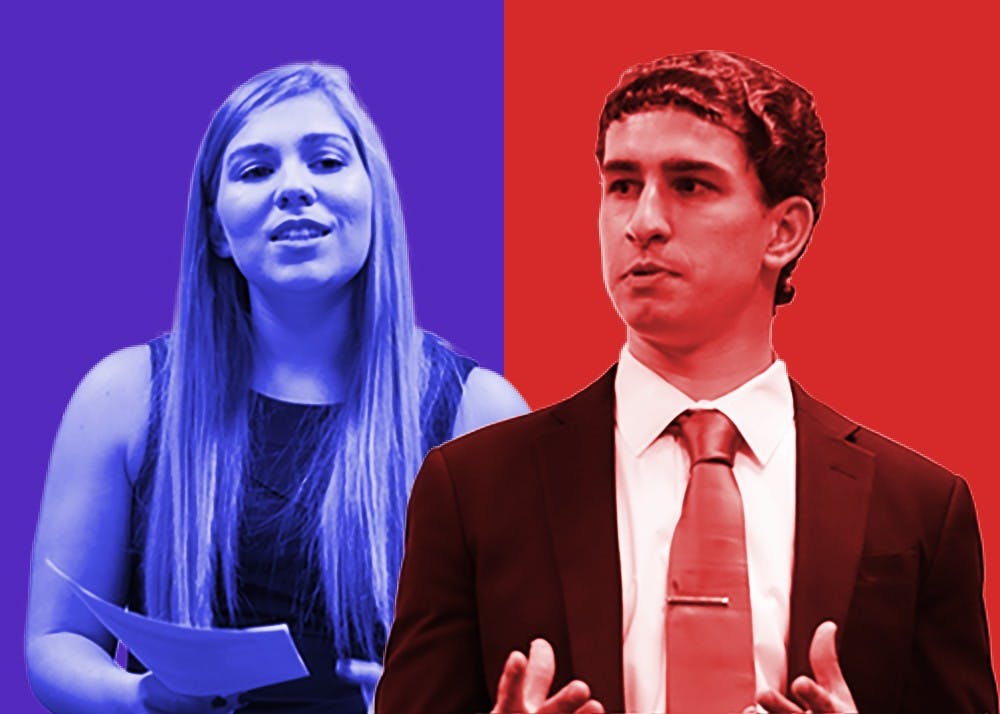IU College Republicans and Democrats came together Monday night for a scheduled debate on issues circulating across the aisle in recent months, including health care, school vouchers and the minimum wage.
Reagan Kurk, a junior, and Terry Tossman, a senior, leaders of the IU College Republicans and Democrats respectively, stood together to remember and respect the victims of Sunday night's mass shooting in Las Vegas.
Professor Brian DeLong, director of Debate at IU, moderated the event.
The College Republicans were represented by Kurk, freshman Matt Bludgen and junior Justin Sexton.
The College Democrats were represented by Tossman, sophomore Raegan Davis and second-year master's student Paige Settles.
School vouchers
A school voucher is a certificate of government funding for a student at a school chosen by the student or the student's parents. The funding is usually for a particular year, term or semester.
Kurk argued that the voucher program is in place to help students regardless of their income, socioeconomic status and ethnicity. She said public education simply takes money allocation based on a zip code, rather than the individual student.
She said students benefiting from school choice are more likely to vote, volunteer and be kind to their peers.
Davis countered by questioning why someone's private school should get increased amounts of money when public schools are being affected the most. Most students leave their private school after a year, she said.
She said school vouchers simply perpetuate a cycle of poverty, giving these advantages more often than not, to those already on a pedestal of advantages.
Minimum wage
A debate around the country is currently focused on the idea of whether or not increasing the minimum wage at the federal level will increase job growth and decrease the unemployment rate and poverty level.
Tossman stuck to statistics, listing various instances of the U.S. raising the minimum wage without suffering a job loss, including a wage raise in the 1960s. He said raising the minimum wage would drive workers at businesses to be more motivated to do a better job and thus drive up business competition.
Bludgen disagreed that workers benefit from an increased wage. He said minimum wage increases hurt people who need the help the most. He cited a 2014 CBO report, which said if the minimum wage was raised to $10.10 more than likely 500,000 jobs would be lost subsequently.
Tossman argued a gradual rise in the minimum wage is the answer, allowing for time to make greater investments in job training and would also allow for job gains without increasing inflation.
Bludgen said it is simply a tool for political gain, and said studies show it has declined employment in the past.
Health care
Sexton focused primarily on premiums, the amount people pay for their health care every month. He said the Affordable Care Act was sold on a pack of lies. He said it makes it more difficult for Medicare and Medicaid recipients to go to doctors, with the sky-high premiums placed on people under the plan.
He said it also prevents businesses from growing, because they must pay for their workers to receive insurance, which prevents them from opening up other locations and hiring more workers.
Settles said multiple times that maybe the Affordable Care Act is not the best plan, but it's the only plan that can work right now. She admitted the current health care system has problems. However, she said it was better than what has been proposed recently to replace it, referencing the Graham-Cassidy bill recently shut down in the Senate. She said the ACA dramatically reduced the percentage of uninsured Americans, falling from 18.2 percent in 2010 to 10.4 percent in 2016.




